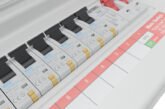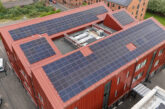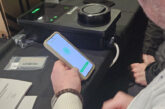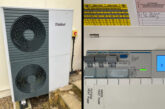
The team at Hager explain why the brand’s Type B HP RCDs are essential for modern heat pump applications.
The electrical industry is experiencing rapid technological advancements and growing regulatory complexities, especially with the push towards renewable energy solutions such as air source heat pumps (ASHPs).
With the increasing adoption of these systems, ensuring safety and compliance in electrical installations has never been more critical. At the forefront of addressing these challenges is Hager’s innovative Type B HP RCD (RCCB), a device specifically designed to meet the unique demands of heat pump applications.
The necessity of Type B RCDs in heat pump installations
Air source heat pumps operate differently from traditional electrical systems. These devices often utilise inverter driven compressors to convert AC power into DC and back again, generating high frequency currents during the AC-DC switching process. These currents can include smooth DC and high-frequency residual currents that exceed the capabilities of standard RCDs.
Type B RCDs are uniquely suited to handle this complexity, as they detect and protect against AC, pulsating DC, and smooth DC residual currents. For heat pump installations, this capability is crucial.
Without appropriate protection, RCDs can become magnetised in the presence of DC components, compromising their functionality. This phenomenon, known as RCD blinding, leaves the system unable to detect earth faults, significantly increasing the risk of electric shock.
Hager’s Type B HP RCDs go beyond the standard Type B capabilities. These devices are specifically engineered to function at frequencies greater than 20 kHz, ensuring a minimum tripping threshold of 150 mA for frequencies above 1 kHz. This precision is critical for addressing the unique safety challenges posed by modern heat pump installations.
High-frequency protection: a step above standard Type B devices?
Not all Type B RCDs are created equal. While many are tested to handle frequency residual currents up to 1 kHz, heat pumps often generate high-frequency currents far beyond this range. Standard Type B devices may trip unnecessarily at these frequencies, leading to nuisance tripping and potential system downtime.
Hager’s Type B HP RCDs are designed to operate effectively at high frequencies, providing robust protection against residual currents at frequencies greater than 20 kHz. This ensures reliable operation, even under the demanding conditions of heat pump systems, eliminating the risk of unnecessary disruptions.
Misconceptions around RCD types
There is often confusion among installers regarding the suitability of different RCD types for heat pump applications. While Types AC, A, F and B serve specific purposes, they fall short in handling the unique challenges posed by heat pumps. The advanced capabilities of Hager’s Type B HP RCDs set them apart, offering enhanced protection at higher frequencies that are critical for heat pump applications.
Ensuring compliance with BS 7671 and manufacturer’s guidance
Regulations play a pivotal role in ensuring the safety and reliability of electrical systems. BS 7671 Regulation 531.3.3 emphasises the need to select RCDs based on their behaviour in the presence of DC components. This ensures that the chosen protective device can tolerate DC currents without becoming magnetised and compromising its functionality.
Hager’s Type B HP RCDs align perfectly with these requirements. Designed to detect and protect against smooth DC faults, they operate effectively at frequencies beyond the capabilities of standard Type B devices. This compliance ensures that installations meet regulatory standards while providing robust protection against electrical faults.
Additionally, Regulation 134.1.1 requires that electrical installations use proper materials and adhere to manufacturer’s instructions. By choosing Hager’s Type B HP RCDs, installers can confidently meet this requirement, ensuring the safety and reliability of their heat pump installations.
Addressing common misunderstandings: Type B+ vs. BS 7671
Some installers mistakenly believe that Type B+ devices, a VDE standard, are suitable for heat pump applications. However, it is essential to note that Type B+ is not recognised under BS 7671. This misunderstanding underscores the importance of selecting devices specifically designed and tested for compliance with UK standards. Hager’s Type B HP RCDs meet these stringent requirements, providing peace of mind for installers and end-users alike.
The future of electrical safety in renewable energy
As the adoption of renewable energy technologies continues to grow, the electrical industry must adapt to new challenges. Heat pumps, with their complex electrical characteristics, highlight the need for advanced protective devices like Hager’s Type B HP RCDs. These devices not only ensure compliance with evolving regulations but also address the unique safety risks associated with modern installations.
By offering high-frequency protection and robust performance in demanding conditions, Hager’s Type B HP RCDs set a new standard for safety and reliability in the electrical industry.
For installers and specifiers, the choice is clear: when it comes to heat pump applications, Hager’s Type B HP RCDs are a reliable solution.
Browse Hager’s full range of Type B HP RCDs here
Find more industry feature articles here










